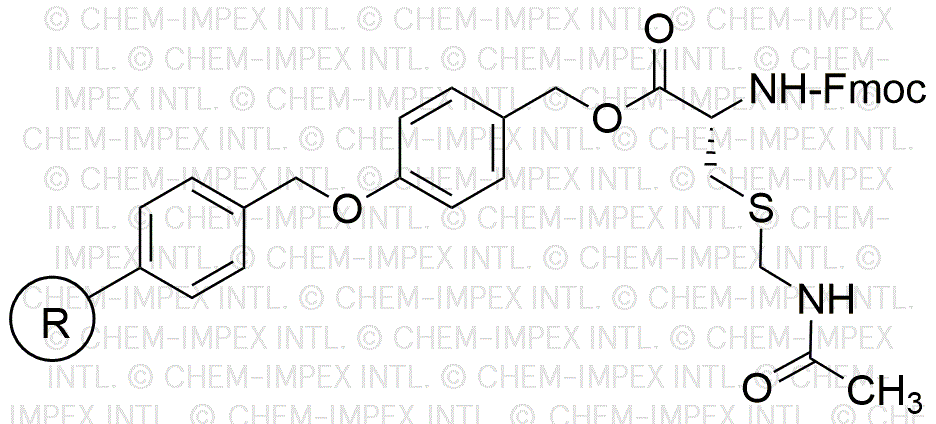Fmoc-S-acetamidomethyl-D-cysteine 4-alkoxybenzyl alcohol resin is widely utilized in research focused on:
- Peptide Synthesis: This resin is essential for the solid-phase synthesis of peptides, allowing for the efficient assembly of amino acids in a controlled manner.
- Drug Development: It plays a crucial role in the design and production of peptide-based drugs, particularly in the pharmaceutical industry, enhancing drug efficacy and specificity.
- Bioconjugation: The resin facilitates the attachment of peptides to other biomolecules, which is vital for creating targeted therapies and diagnostic tools in biotechnology.
- Research in Proteomics: It aids researchers in studying protein interactions and functions by enabling the synthesis of modified peptides that can mimic natural proteins.
- Customizable Applications: The versatility of this resin allows for modifications, making it suitable for various applications in both academic and industrial settings, thus meeting diverse research needs.
General Information
Properties
Safety and Regulations
Applications
Fmoc-S-acetamidomethyl-D-cysteine 4-alkoxybenzyl alcohol resin is widely utilized in research focused on:
- Peptide Synthesis: This resin is essential for the solid-phase synthesis of peptides, allowing for the efficient assembly of amino acids in a controlled manner.
- Drug Development: It plays a crucial role in the design and production of peptide-based drugs, particularly in the pharmaceutical industry, enhancing drug efficacy and specificity.
- Bioconjugation: The resin facilitates the attachment of peptides to other biomolecules, which is vital for creating targeted therapies and diagnostic tools in biotechnology.
- Research in Proteomics: It aids researchers in studying protein interactions and functions by enabling the synthesis of modified peptides that can mimic natural proteins.
- Customizable Applications: The versatility of this resin allows for modifications, making it suitable for various applications in both academic and industrial settings, thus meeting diverse research needs.
Documents
Safety Data Sheets (SDS)
The SDS provides comprehensive safety information on handling, storage, and disposal of the product.
Product Specification (PS)
The PS provides a comprehensive breakdown of the product’s properties, including chemical composition, physical state, purity, and storage requirements. It also details acceptable quality ranges and the product's intended applications.
Certificates of Analysis (COA)
Search for Certificates of Analysis (COA) by entering the products Lot Number. Lot and Batch Numbers can be found on a product’s label following the words ‘Lot’ or ‘Batch’.
Número de catálogo
Número de lote/lote
Certificates Of Origin (COO)
This COO confirms the country where the product was manufactured, and also details the materials and components used in it and whether it is derived from natural, synthetic, or other specific sources. This certificate may be required for customs, trade, and regulatory compliance.
Número de catálogo
Número de lote/lote
Safety Data Sheets (SDS)
The SDS provides comprehensive safety information on handling, storage, and disposal of the product.
DownloadProduct Specification (PS)
The PS provides a comprehensive breakdown of the product’s properties, including chemical composition, physical state, purity, and storage requirements. It also details acceptable quality ranges and the product's intended applications.
DownloadCertificates of Analysis (COA)
Search for Certificates of Analysis (COA) by entering the products Lot Number. Lot and Batch Numbers can be found on a product’s label following the words ‘Lot’ or ‘Batch’.
Número de catálogo
Número de lote/lote
Certificates Of Origin (COO)
This COO confirms the country where the product was manufactured, and also details the materials and components used in it and whether it is derived from natural, synthetic, or other specific sources. This certificate may be required for customs, trade, and regulatory compliance.


